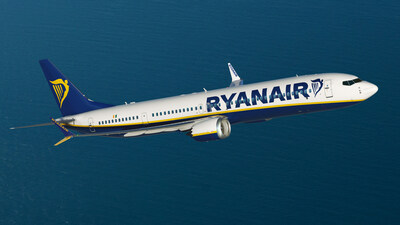
A European Union court toppled Germany’s massive bailout of Deutsche Lufthansa AG at the height of the Covid-19 pandemic, backing Ryanair Holdings Plc’s claims that the package unfairly tilted competition toward its rival.
Terms of a €6 billion-euro ($6.6 billion) recapitalization approved by the European Commission were too favorable to Lufthansa, and demands that Europe’s biggest network carrier forfeit take-off and landing rights in Frankfurt and Munich were structured in a way that didn’t provide a realistic chance for competition, the court ruled.

The court also sided with Ryanair on a challenge to state aid to Sweden’s SAS AB. The Irish discount carrier has a similar case pending over the bailout of Air France-KLM.
Next Steps
The Brussels-based commission said it will “carefully study the judgment and reflect on possible next steps.” Wednesday’s judgment can be appealed.
The commission allowed deep-pocketed national governments to weigh in too strongly on the side of ailing flag-carrier airlines, Ryanair said in a statement
“Today’s judgments confirm that the commission must act as a guardian of the level playing field in air transport and cannot sign off discriminatory state aid under political pressure by national governments,” the airline said.
In annulling the commission’s decision to approve the aid package, the EU General Court in Luxembourg on Wednesday said the commission’s assessment included “several errors” and that it was wrong to consider that Lufthansa “was unable to obtain financing on the markets for the entirety of its needs.”
Chief Executive Officer Carsten Spohr has pointed out that German taxpayers made a profit when the government sold its 20% stake that came with the bailout.
“Lufthansa will analyze the ruling and then decide on further action,” the company said in an emailed statement.
Return to Growth
Lufthansa is in expansion mode as European travel recovers from the pandemic, which abruptly halted travel and threw airlines across the world into crisis. In addition to buying new aircraft and establishing new routes, the carrier is in late-stage talks to acquire a stake in Italy's state-owned carrier ITA Airways, a move that will expand its business empire further south and create a new major hub in Rome.
Meanwhile, discount airlines are retreating from Lufthansa’s home markets. EasyJet quit the popular Frankfurt-Berlin route in 2020, and last year Ryanair abandoned Frankfurt altogether, saying the sky-high landing and terminal fees at Germany’s biggest airport — operated by Fraport AG, a company partly owned by Lufthansa —rendered service there impossible.
In total, Lufthansa received some €9 billion of state aid during the pandemic, the bulk of it from Germany, which obtained a 20% stake in the carrier, with contributions from Switzerland, Austria, and Belgium.
Court Decision
Wednesday’s case concerns the German government’s plan to pay 300 million euros for the 20% stake and make two so-called silent participations of €4.7 billion and €1 billion in the company’s capital. The court criticized the EU commission for not including a step-up mechanism to make elements of the financing increasingly more expensive for Lufthansa.
The commission in June 2020 approved the Lufthansa measures, saying the government plan was in line with the bloc’s state-aid rules and would prevent the carrier’s collapse.
SAS Ruling
Ryanair also won a separate bid to topple the EU’s 2020 approval of similar aid to SAS.
The Scandinavian airline initially received aid from Sweden, Denmark and Norway but then struggled to obtain added relief from bondholders and shareholders, including Sweden’s Wallenberg family. The airline filed for US Chapter 11 bankruptcy protection in July 2022, and creditor Apollo Global Management plans to take a majority stake, according to Reuters.







